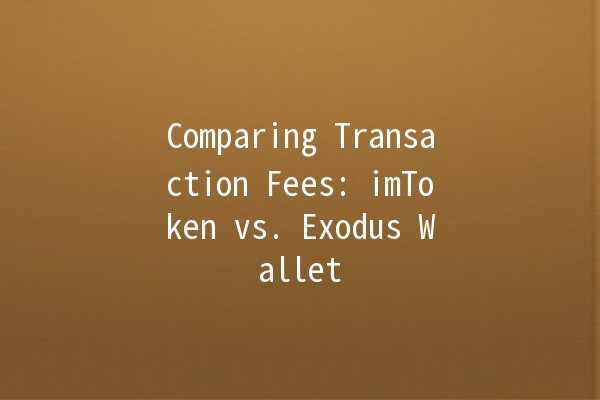In the rapidly evolving world of cryptocurrency, choosing the right wallet for managing your digital assets is essential. Two of the most popular wallets on the market are imToken and Exodus. Both wallets offer unique features and benefits, but one of the most critical aspects users consider is the transaction fees associated with each platform. This article will delve into the transaction fee structures of imToken and Exodus, providing valuable insights to help you make an informed decision.
imToken is a decentralized wallet designed to manage various cryptocurrencies, including Ethereum and its tokens. Its userfriendly interface makes it accessible for both beginners and experienced users. The wallet supports decentralized finance (DeFi) applications, enabling users to engage in various financial activities.
Exodus is a software wallet that offers users a simple way to manage a wide range of cryptocurrencies. It features an integrated exchange that allows users to trade directly between different cryptocurrencies without needing a third party. Exodus is known for its aesthetically pleasing design and userfriendly experience, making it a popular choice among newcomers to the crypto space.
imToken utilizes a dynamic fee mechanism based on the Ethereum gas fees associated with your transactions. The fees are calculated based on network congestion. Users can select from various fee levels, including low, medium, and high, depending on how quickly they want their transactions to be confirmed.

Low Priority: A user may choose to pay a lower fee, resulting in slower transaction confirmation. For example, during periods of low congestion, a transaction fee of around 20 Gwei might be sufficient.
High Priority: During peak times, users may opt for a higher fee (e.g., 100 Gwei) to ensure faster confirmation.
Exodus also follows a dynamic fee structure, allowing users to adjust their fees based on urgency and network conditions. The wallet aims to offer a fair fee, reflecting the required amount for transactions to be processed efficiently.
Standard Fee: Typically around 0.0005 BTC or equivalent in other cryptocurrencies for standard transactions, allowing for timely confirmations without overspending.
Custom Fees: If users want faster processing, they might choose to pay up to 0.001 BTC during peak times.
| Aspect | imToken | Exodus |
||||
| Fee Calculation | Based on Ethereum gas fees | Dynamic; userdefined |
| Minimum Fee | Starts at around 20 Gwei | Typically 0.0005 BTC or equivalent |
| High Priority Cost | Up to 100 Gwei | Up to 0.001 BTC for speed |
| User Customization | Yes | Yes |
In addition to understanding the fee structures of imToken and Exodus, users can consider several productivityenhancing tips when managing their cryptocurrency wallets.
Utilizing fee estimation tools can help users determine the optimal fees to choose based on current network conditions. Tools like Gas Now or ETH Gas Station provide realtime insights into gas prices, enabling better fee management.
Always ensure your wallet is secure by enabling twofactor authentication and using strong passwords. This practice helps protect your assets from unauthorized access and potential losses.
To minimize fees, consider consolidating your transactions. For instance, instead of sending small amounts frequently, group your transactions to make fewer, larger transfers. This will save on cumulative transaction fees.
Monitor announcements and updates about network changes or improvements, as these can affect transaction fees and processing speed. Keeping abreast of these updates can help you plan your transactions more effectively.
Periodically assess your cryptocurrency wallets and their features. As user needs change, you may find one wallet better suited for your activities than another. This ongoing evaluation will improve your longterm trading efficiency.
Transaction costs depend on various factors, including network congestion and transaction complexity. ImToken may be more costeffective for Ethereum transactions, while Exodus has competitive fees for a broader range of cryptocurrencies. Evaluating your specific needs is essential.
Yes, both imToken and Exodus allow users to customize transaction fees. You can select from different fee levels based on your urgency and the network's current state.
Exodus features an integrated exchange, which might involve a fee for currency conversion. ImToken allows users to access decentralized exchanges, where the fees depends on the network conditions of the tokens being exchanged.
Yes, both imToken and Exodus support various cryptocurrencies. imToken focuses on Ethereum and ERC20 tokens, while Exodus has broader support for many native cryptocurrencies.
When the Ethereum network is congested, both wallets may require higher fees for transactions to be confirmed quickly. Users should keep an eye on network congestion when planning transactions.
Both wallets have certain limits based on the blockchain’s rules and fees. It is advisable to check each asset’s specific guidelines within the wallet for accurate information regarding sending limits.
The choice between imToken and Exodus ultimately depends on your specific needs, transaction habits, and preferred cryptocurrencies. Understanding the transactions fee structures of each wallet is vital for informed financial decisionmaking. By leveraging the aforementioned productivity tips and remaining vigilant about market conditions, you can effectively manage your digital assets with either wallet.
In a fastpaced financial landscape, staying informed will undoubtedly assist you in optimizing your cryptocurrency management experience!